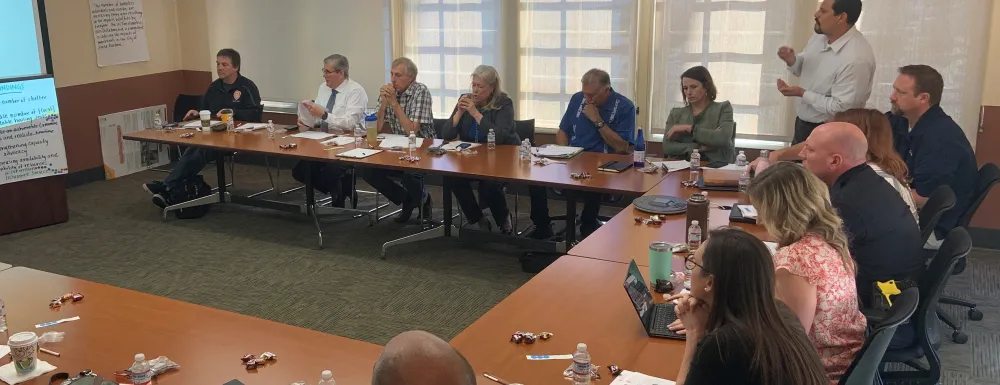
Santa Barbara ACT on Homelessness Collaborative
About the Collaborative
The Santa Barbara Alliance for Community Transformation (SB ACT) builds collaborative partnerships with stakeholders to develop strategies and coordinate operations in response to complex social issues. Since Fiscal Year 2020, SB ACT has provided administrative support and facilitation of the ACT on Homelessness Collaborative to bring together City departments, nonprofit organizations, business associations, community members, individuals who have experienced homelessness, and others engaged in responding to the homelessness crisis. SB ACT facilitated the development of a Three-Year Common Agenda/Strategic Plan (Strategic Plan) for the City of Santa Barbara, which was completed in June 2023. SB ACT also formed Regional Action Plans (RAPs) to address immediate impacts of homelessness in specific neighborhoods— starting with the State Street area and later expanding to the Waterfront and Eastside areas.
One-Year Priority Plan
Per direction from City Council, at the start of Fiscal Year 2024 SB ACT facilitated the expansion of the ACT on Homelessness Collaborative to include all of South County, bringing in representatives from Goleta, Carpinteria, and Montecito. Under SB ACT’s stewardship, the collaborative developed and implemented a region-wide “priority plan” identifying key numeric and policy goals to be completed by September 30, 2024. The final report on the one-year plan can be accessed at: sbact.org/aoh. Major achievements are as follows:
- Behavioral Health: Facilitate positive housing and/or behavioral health outcomes for 50 percent of 15 of the “highest acuity” individuals in South Santa Barbara County.
- Achievement: In total, 7 individuals (of a goal of 8) were placed in interim/permanent housing or enrolled in comprehensive behavioral health programs. Two individuals were also enrolled with CalAIM, enabling them to access increased supports and funding for their journey to housing.
- Vehicular Homelessness: Facilitate a sustained increase in the number of fully enrolled Safe Parking RV parking spots in South Santa Barbara County by 25 percent.
- Achievement: The 25 percent increase in total spaces through the Safe Parking Program (a goal of 27) was unfortunately not realized. Though, in June 2024, the County and City of Santa Barbara were awarded a $7.9 million California Encampment Resolution Funding (CERF) grant to address vehicular encampments. As of June 2025, a total of 81 individuals have been enrolled in the program in the City of Santa Barbara which includes 56 vehicles. A total of 24 individuals have been permanently housed and 29 individuals of been temporarily housed.
- Public Narratives:
- Increase the number of media releases about homelessness by 15 percent and increase positive narratives about homelessness by 15 percent; and
- Reduce non-emergency calls to emergency responders for service regarding homelessness by 15 percent (i.e., redirect non-emergency calls to appropriate reporting systems such as SB Connect)
Achievement: The number of stories about homelessness increased by 44% (140 total headlines), far exceeding the goal of 112 total headlines. These stories included key topics that had not been addressed in the previous year’s homelessness media releases, such as vehicular homelessness and behavioral health. Sentiment scores increased from 1.04 to 1.16 (on a scale of -3 to +3), just short of the goal of 1.20.
The number of emergency calls dipped slightly from 835 per month to 802 per month, and City reporting increased from 75.5 to 80 reports per month. So while Collaborative efforts yielded some progress, more work is needed to direct community members to the appropriate resources.
New Three-Year Strategic Plan
Building on momentum from the one-year priority plan, the South County ACT on Homelessness Collaborative committed to a new Three-Year Strategic Plan to address homelessness across the region. The four goals created with stakeholder engagement and public feedback are as follows:
- Homelessness Prevention: Increase the number of households diverted from homelessness by 15%.
- Behavioral Health: Facilitate 25 individuals with high acuity behavioral health needs moving into interim housing and 20 moving into and retaining permanent supportive housing.
- Housing Retention: Reduce the number of returns to homelessness (up to 1 year housed) by 25%.
- Perceptions and Attitudes: Improve the attitudes towards homelessness among local business leaders and key stakeholder groups by 20%.
Data has been collected to establish a baseline for on-going measurement and continuous improvement which will be monitored by the Collaborative’s Steering Committee through quarterly meetings.
